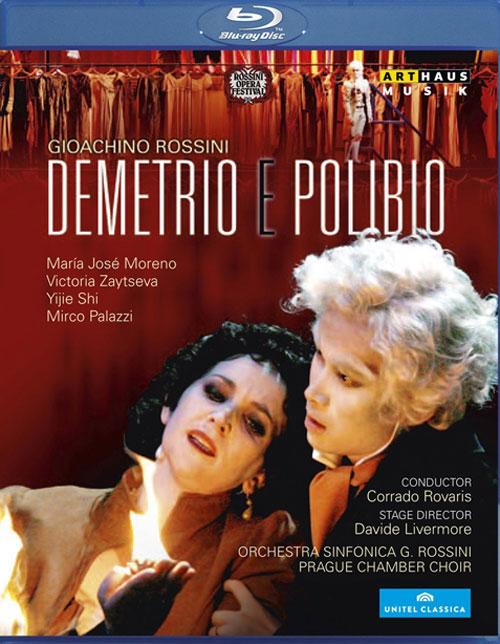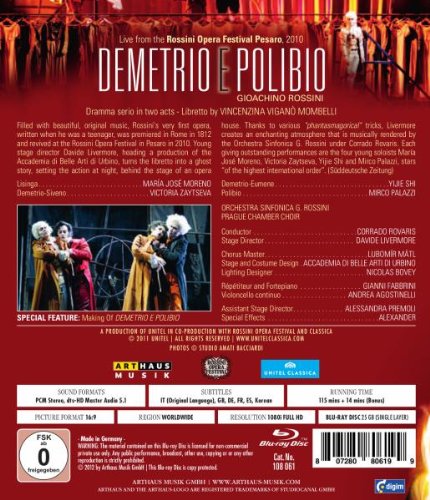Rossini: Demetrio e Polibio / Moreno, Zaytseva, Shi, Rovaris [Blu-ray]
Conductor: Corrado Rovaris | Composer(s): Gioachino Rossini, Vincenzina Vingano Mombelli (Lyricist) | Chorus master: Lubomír Mátl | Performers: Valeria Zaytseva, Maria Josè Moreno, Yijie Shi, Mirco Palazzi | Orchestra/Ensemble: Gioachino Rossini Symphony Orchestra, Prague Chamber Choir | Producers: Rossini Opera Festival | Label: Arthaus Musik | Blu-ray | Picture format: 1080i Full-HD | Sound format: PCM Stereo / DTS-HD Master Audio 5.1 | File hosts: Uploaded.net, share-online.biz | 5% recovery record + 1 .rev file | Run time: 115 mins (opera) + 14 mins (bonus) | 22.19 GB
Language(s): Italian | Subtitle(s): Italian, English, German, French, Spanish, Korean
Recorded live at the Rossini Opera Festival Pesaro, 2010
Conductor: Corrado Rovaris | Composer(s): Gioachino Rossini, Vincenzina Vingano Mombelli (Lyricist) | Chorus master: Lubomír Mátl | Performers: Valeria Zaytseva, Maria Josè Moreno, Yijie Shi, Mirco Palazzi | Orchestra/Ensemble: Gioachino Rossini Symphony Orchestra, Prague Chamber Choir | Producers: Rossini Opera Festival | Label: Arthaus Musik | Blu-ray | Picture format: 1080i Full-HD | Sound format: PCM Stereo / DTS-HD Master Audio 5.1 | File hosts: Uploaded.net, share-online.biz | 5% recovery record + 1 .rev file | Run time: 115 mins (opera) + 14 mins (bonus) | 22.19 GB
Language(s): Italian | Subtitle(s): Italian, English, German, French, Spanish, Korean
Recorded live at the Rossini Opera Festival Pesaro, 2010

“What a pleasure to listen to Demetrio e Polibio”, wrote major Italian daily “La Stampa” after the premiere of Rossini‘s very first opera at the 2010 Rossini Opera Festival in Pesaro, attributing it “an undeniable fascination“. The work was given its first performance in Rome in 1812. It is still unclear whether Rossini was 14 or 18 when he wrote it; what is beyond doubt, however, is the anticipation of great things to come. The libretto is a far-fetched tale of feuding kings, mistaken identities, disguises and cruel fates typical of the late 18th-century opera seria.
Watch a Trailer (sample is a lower resolution than actual DVD or Blu-ray):
Young stage director Davide Livermore, heading a production of the Accademia di Belle Arti di Urbino, turns the libretto into a ghost story, setting the action behind the stage of an opera house, when everyone has left and all that remains are the spirits of an opera that yearns for the breath of life – much like the practically forgotten “Demetrio e Polibio” itself. With the help of little flames that flare up from the singers‘ palms and other “phantasmagorical“ tricks, Livermore creates an enchanting atmosphere that is given a perfect musical rendering by conductor Corrado Rovaris (Music Director of the Opera Company of Philadelphia) and the Orchestra Sinfonica Rossini. Each giving outstanding performances are the four stand-out soloists Maria José Moreno, Victoria Zaytseva, Yijie Shi and Mirco Palazzi, “stars … of the highest international order“ (Süddeutsche Zeitung). Once again, the Rossini Opera Festival fulfills its dual goal of performing unknown Rossini works in new, critical editions, and of fostering young singers on their path towards the world‘s great stages.
CAST:
Lisigna – María José Moreno
Demetrio-Siveno – Victoria Zaytseva
Demetrio-Eumene – Yijie Shi
Polibio – Mirco Palazzi
Prague Chamber Choir
(chorus master: Lubomír Mátl)
Orchestra Sinfonica G. Rossini
Corrado Rovaris, conductor
Davide Livermore, stage director
Accademia di Belle Arti di Urbino, stage and costume design
Nicolas Bovey, lighting designer
Recorded live at the Rossini Opera Festival Pesaro, 2010
Bonus: - Making of Demetrio e Polibio
REVIEW:
FANFARE: Bill White
You could call Demetrio e Polibio Gioachino Rossini’s opera on the installment plan. Written in his midteens during his student years in Bologna, Rossini was only given the work one piece at a time by his friend Domenico Mombelli. He wrote the arias, duets, and ensembles piecemeal, getting only pocket money in return. For a span of time the boy composer didn’t even know he was working on an opera. Whether this process saved Mombelli money or whether his wife, Vincenzina, who wrote the libretto, was just working slowly, we may never know. Perhaps Mombelli could only afford one piece set to music at a time. At any rate in this fashion the opera was duly finished, and Mombelli, whose family comprised a small touring opera company put the work away for five or six years. In the meantime, Rossini left school and began his professional career. In 1812 when the composer already had five staged works to his credit and his name was beginning to become well known in opera circles, Mombelli dusted-off Rossini’s first opera and staged it in Rome, where it was a moderately successful hit.
Much of the music in this juvenile work is problematic. Most of the arias are quite pedestrian, even the showcase arias for tenor and soprano (Papa Mombelli was the tenor, one of his daughters a quite good soprano). The choruses and ensembles are a bit better. One duet in act I, “Questo cor ti giura amore” is startlingly good, modeled after Mozart. In it two female voices singing in thirds entwine in ravishing and enchanting fashion. Rossini was to use the piece over again later in his career. The act II quartet for all four principals has garnered some praise but I thought it only a bit above average. Both the act I and act II finales are lively with some enjoyable music in them. It is known for nearly certain that Rossini didn’t write the recitatives for Demetrio e Polibio, and likely not the overture either. The composer’s autograph manuscripts have been lost, but stylistically some of the remaining music seems likely by another hand as well, probably Mombelli’s.
The story is set in ancient Parthia. Siveno, the son of Demetrio, King of Syria (although no one knows that) has been left at the Parthian court to protect him from political unrest at home. While in Parthia, Polibio, the local king, has taken a liking to young Siveno, raising the boy as his own adopted son. Also taking a liking to Siveno is Polibio’s daughter, Lisinga, and the two are now betrothed. Political troubles put to rest, King Demetrio comes to Parthia disguised as his own emissary, Eumene, seeking his son and heir. He demands the young man be returned to Syria, but Polibio refuses, even under the threat of Syrian retribution. He’s to be my successor, the king tells Eumene. Demetrio (Eumene) decides to take matters into his own hands and abduct Siveno. Good plan, but the muddled Syrians take the daughter, Lisinga, by mistake. Still okay, says Demetrio, we can use her as a hostage. Fine, replies Polibio, I’ll just make a hostage of the boy, you Syrian goat! From that point we get much bluster and sword-rattling from the two kings, much hand-wringing and bemoaning of lost love from the kids, before Demetrio finally reveals his true identity and that of his son to the others. The two kings agree to be pals while they all sing the happy finale and now Demetrio Jr. can use the correct name on his marriage license.
A bit of a rickety plot by Mrs. Mombelli, made even worse when set in Parthia, which, I’m told, was not a tourist destination at the time. Far better is the Rossini Fest locale, backstage at a modern theater, shut down and secured for the night after a performance. That’s when the ghosts of a long-ago cast arise from the packing cases and perform the opera again, amidst the backstage clutter, and for a brief change of setting in each act, the costume storage room. Costumes are evocative of 18th-century finery rather than of the 2nd century B.C. but suit the piece just fine. Fire is one of the themes, with small flames burning in the singers’ hands and floating candles and candelabras emphasizing the ghostly nature of the performance. The chorus holds burning torches while they sing in one scene. To add further evidence of ghostly goings-on, during the hostage crisis both kings punch their arms completely through the bodies of their young hostages. (No, sweetie, he didn’t really hurt her, they’re ghosts and it’s just an illusion.) To further confuse the reality-fantasy continuum, each of the characters has a mute double, quite cutely named phantoms of the opera in the booklet, which appear often, show up in mirrors, appear and disappear at random, interact with other characters and even their own alter egos. Often you don’t know if you are looking at the singers or the mimes. All of this may sound a bit busy, but it is quite entertaining visually. At the conclusion, the singers are singing their last notes while a dance troupe unpacks and begins preparing for the next day’s performance, completely unaware of the host of ghostly performers around them.
As usual, the Rossini Fest also gets it right musically. For this updated opera seria they have brought in four very strong young singers, among the best I have heard in a while. The role of Lisinga gets much of the pyrotechnic music, even if it is a shade below Rossini’s best efforts, and Spanish coloratura soprano Maria José Moreno sails through it with confidence and panache. It’s clear she has been coached here by experts, but she is quite literally one of the best I have heard in coloratura passages and in ornamenting the line. She sings beautifully and all her top notes are firmly in place. Coloratura singing is not just for stratospheric sopranos, and I confess, I have never before heard a bass with as much vocal agility and bel canto technique as Italian Mirco Palazzi in the role of good King Polibio. He brings a rich, dark-hued tone as well, making his singing very enjoyable listening. He should be teaching at Pesaro, not just singing there, and I look forward to his future roles. The pants role of Siveno has less music than the others but mezzo-soprano Victoria Zaytseva performs in excellent fashion as well, and her voice melds particularly well with Moreno’s in the lovely act I duet. Chinese tenor Yijie Shi has a light instrument that sounds a bit like Juan Diego Flórez in the role of King Demetrio, but he lacks some of the bel canto technique of his more famous colleague. Shi’s voice is easy to listen to, always on pitch and thrilling at the top, a lot to ask from our current batch of tenors, so he brings added strength to this fine production. The G. Rossini Orchestra and Prague Chamber Chorus both perform admirably as usual, the chorus in particular getting a strong workout in Rossini’s score. The music may be only average Rossini, but that is still quite enjoyable listening, and the singers here make it just a bit more special.
There are no other videos of Demetrio e Polibio. There are two-CD sets which have been out there for a while, one on Bongiovanni which I have not heard, and one on Dynamic which features a screechy soprano, a quavery bass, and a wayward tenor. Only mezzo Sara Mingardo performs well, and she sings the least. I think we can probably assume we have the best musical presentation right here. The Blu-ray video quality is sharp and finely nuanced, and the sound formats are both excellent on this Arthaus recording. There is an interesting bonus piece on the making of the opera included as well. The notable quality of the production, imaginative story-telling, and top notch singing make this set easily one of the highest recommendations of the year.
Works on This Recording
1.
Demetrio e Polibio by Gioachino Rossini
Performer: Valeria Zaytseva (Voice), Maria Josè Moreno (Soprano), Yijie Shi (Voice), Mirco Palazzi (Bass) Conductor: Corrado Rovaris
Orchestra/Ensemble: Gioachino Rossini Symphony Orchestra
Period: Romantic
 No Password
No Password


0 comments:
Post a Comment